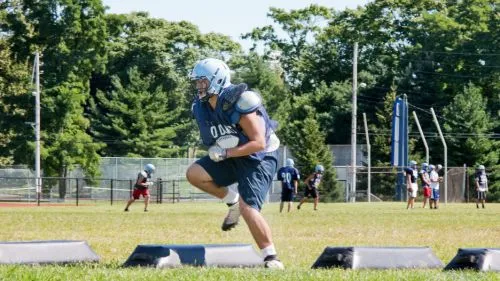Should you quit your sport if it’s causing you anxiety?
This is a question I receive a lot. I work with many athletes who are struggling with anxiety and simultaneously questioning whether or not they want to continue playing their sport.
In this article, I’m going to walk you through five questions you can ask yourself to work through the overall question of: should you quit your sport if it’s causing you anxiety?
Why Is Anxiety Causing You to Want to Quit?
The first question you want to ask yourself is: why is anxiety causing you to want to quit your sport?
This is important because we have to first examine the true reason you want to quit.
Is anxiety getting you to the point where games are not fun anymore? Are practices stressful?
I experienced a lot of anxiety when I was a baseball player. I can remember showing up to college practices extremely stressed. I would worry throughout the week, and it honestly made me question: do I want to keep playing this sport?
Ask yourself:
-
Is anxiety causing you to underperform, leaving you frustrated and disappointed in yourself?
-
Is anxiety making you want to avoid practice altogether, so you aren’t training as much as before?
This is where we need to start—understanding what it is about anxiety that is leading you to think, maybe I want to quit my sport.
Is It Really Anxiety That’s Making You Want to Quit?
The second question is: is it really anxiety that’s causing you to want to quit?
In other words, is anxiety the real reason you’re not enjoying your sport anymore? That’s why we begin with the first question, identifying how anxiety impacts you.
For example, I worked with a football player last season who was questioning if he wanted to continue playing. A lot of it seemed like anxiety, but when we dug deeper, the real reason was his environment. The environment created a lot of anxiety for him.
It wasn’t that he didn’t enjoy football anymore—it was the situation he was in.
After talking with his parents, he changed teams. As a result, his anxiety reduced significantly, and he realized he actually enjoyed the sport a lot more.
Now, I know it’s not always an option to change teams. But sometimes that can be a good first step if the environment is the true cause of your anxiety.
What’s Driving Your Anxiety?
The third question: what’s really driving your anxiety?
This helps you figure out if quitting your sport will help or if something else—like changing environments—is needed.
Many athletes I work with who deal with anxiety also struggle with fear—fear of making mistakes, fear of letting people down. And honestly, that has nothing to do with the sport itself. That’s a pattern of thinking.
Ask yourself:
-
Is it the sport that’s causing the anxiety?
-
Or is it the way you’re thinking about the sport?
If it’s fear of results, mistakes, or pressure to practice perfectly, then quitting won’t solve the problem. Because even if you quit, those same thought patterns may follow you into school, work, or another sport.
If we can work on shifting your focus—to the process, to enjoying the game, to letting go of results—we’ll see anxiety reduce. Then the joy may return, and the question of quitting might solve itself.
Have You Worked on Your Anxiety?
The fourth question is: what kind of work have you done to manage this anxiety?
If the cause of your anxiety is fear or pressure, you need to take steps to reduce it. That means:
-
Shifting focus from results to the process
-
Focusing on what’s in your control
-
Using sports psychology tools like breathing, mindfulness, and visualization
-
Reframing self-talk to be more positive instead of fixating on mistakes or worries
If you go through this process, anxiety will reduce, and you might find the joy of your sport returning. At that point, quitting may not feel like the answer anymore.
Should You Take a Break?
The last question is: should you take a break?
If you’re experiencing dread and anxiety, taking a break can be a great short-term solution. Sometimes it’s very difficult to work on anxiety while you’re still playing, especially if you’re in the middle of a season or a negative environment.
So, consider stepping away for a bit. During that time, work on your thinking, develop anxiety-coping tools, and build a different mentality. Then you can return with a fresh perspective.
And remember: quitting doesn’t have to be permanent. Sometimes you just need a break to reset and regain joy in your sport.
Mental Coaching for Anxiety
With that being said, I do offer one-on-one mental performance coaching to help athletes with performance anxiety and other mental game challenges.
If you’re questioning whether you should quit your sport because of anxiety, or you want to take a break while working through it, my one-on-one coaching program can be a great first step.
Anxiety can absolutely be worked through. But even if you do decide to quit your sport, I encourage you to address the underlying anxiety—because if you don’t, it will likely show up in other areas of your life.
Think through your decision clearly and carefully. Consider taking a break, focus on managing the anxiety, and give yourself the best chance to bring back the joy of your sport.
Thank you for reading and I wish you the best of success in all that you do.




